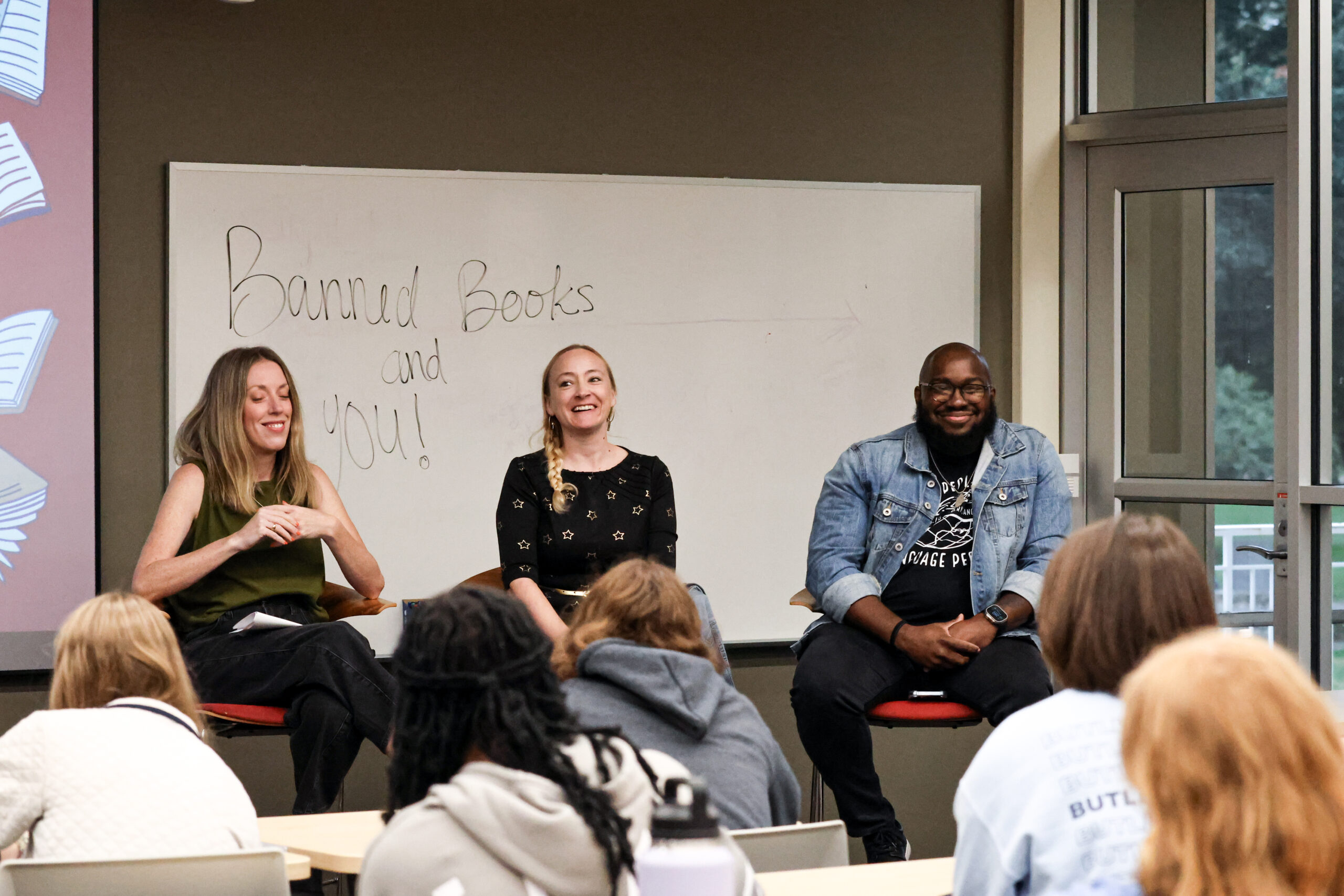Banned books panel featuring Sara Gelston Somers, Suzanne Walker and Thomas Kneeland. Photo by Jada Gangazha.
JULIA VERES | STAFF REPORTER | jveres@butler.edu
For the second year, Irwin Library hosted a panel on literary censorship on Sept. 27. “Banned Books and You” discussed the topic of restriction in public libraries and schools by inviting experts from the Indianapolis area to speak. The panel featured Sara Gelston Somers, the owner of Golden Hour Books, Indiana State Librarian Suzanne Walker and Thomas Kneeland, an assistant professor of English at Anderson University.
Book censorship falls into one of two categories: challenged books or banned books. Challenged books are books that any person has asked to be reviewed for removal from a school or library, but most of them are unsuccessfully removed. A challenged book only becomes banned once a school or library has reviewed it and decided to remove it from their shelves.
In the 2023-24 school year, around 10,000 books were banned in the US — nearly three times the amount banned the previous year.
The event was structured as an audience-led questions and answer session, where students could ask panelists questions on bans and censoring. This interactive style allowed students to learn about what causes book bans as well as how to advocate against them.
Indiana Bill 1447 — implemented on May 4, 2023 — banned any material deemed to be “obscene” or “harmful” to minors. These subjects include sexual content, political bias and descriptions of marginalized communities. It also required all schools to publicly post their libraries’ catalogs.
The interpretation of possibly controversial content in books is subjective to how each person or group interprets it. For example, someone may consider content involving LGBTQ+ topics inappropriate for children, which could result in a book ban.
During the panel, Kneeland discussed how banning books can erase important history. Since books targeted by the bans include controversial and diverse subjects, removing them from libraries minimizes the stories they tell. It also limits young readers’ access to stories that represent their complex identities.
“If it is no longer there, it no longer matters,” Kneeland said. “There’s so much Black history, Latin history and LGBTQ+ history that has helped shape what America is. If we continue to perpetuate [literary censorship], we have a generation who would not know who they are.”
As a librarian, Walker’s experience with book bans gives her a key insight into their effect. Bans can cause what is called the “chilling effect.”
“[The chilling effect] is the idea that librarians get afraid to buy books that [parents] challenge or may be banned, so they proactively don’t get them so that they won’t be challenged,” Walker said. “We see that a lot in school in particular, where school librarians are afraid to buy something for their collection that might feel controversial.”
Though the “chilling effect” is a repressive measure that librarians face, Walker explained that there is a positive to come out of book banning. Librarians are now being trained on how to handle books that are challenged or banned regarding their process for reviewing books as well as specific library rules.
Senior English major Miranda Emerick works as an Information Commons associate at Irwin Library and helped organize the event. She explained why banned books is something she is enthusiastic about.
“I’ve always been passionate about banned books and access to literature,” Emerick said. “Book banning decreases access to literature across the board, specifically for people of color and LGBTQ+ students and people. It decreases access for those kids who rely on libraries, who rely on their schools. Bringing awareness helps us have a voice in stopping people from trying to pull books out of school that could be really important and very meaningful to the people who need them.”
Ironically, book bans can produce some excellent outcomes for others in the book industry. Gelston Somers was able to provide a unique insight into how book bans impact the commercialized side of books.
“Banning books is actually wonderful for bookstores,” Gelston Somers said. “It’s the best business tool. People come in hungry for books that are banned, specifically seeking them out. People come in there asking ‘Where’s your banned book section?’ Here are 5,000 titles. Take your pick.”
Despite discussing an oxymoronic benefit, all panel members and the hosts emphasized how important it is to fight book bans. By allowing students to learn different — perhaps controversial — things through books, they broaden their intellectual and empathetic boundaries.



